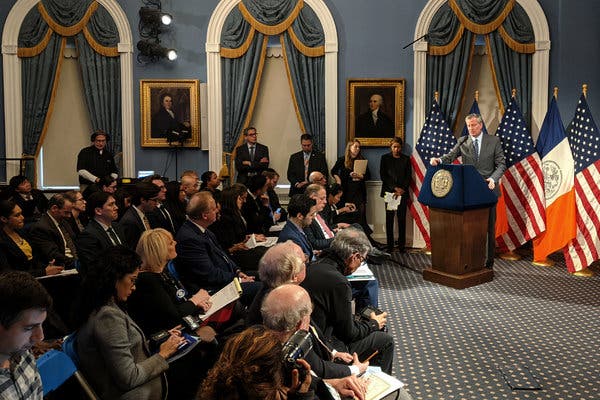The divide between Mayor Bill de Blasio and Gov. Andrew M. Cuomo has colored many city vs. state squabbles, seeping into disputes over subway repairs, school funding and solving the homelessness crisis.
Now it appears to be threatening the city’s budget.
On Thursday, Mr. de Blasio released a $95.3 billion budget proposal that called for a 2.7 percent increase — the smallest percentage increase in his six years in office.
Even though city revenues are expected to be strong, the mayor said that the state’s projected $6 billion deficit could loom large over New York City, and that the state could cut its funding to the city, or ask the city to increase its share of payments for things like the subway.
“Medicaid cuts could reverse years of progress at NYC Health & Hospitals and impact health care for the most vulnerable,” Mr. de Blasio said in a statement. “We will work with our partners in Albany to continue to find savings while fighting to protect health care for all New Yorkers.”
Mr. de Blasio, a Democrat in his second term, has overseen a period of booming growth in tax revenue and economic prosperity, allowing him to spend more than past mayors: Mr. de Blasio, for example, has expanded the city’s work force past 350,000 people.
But this year, officials in New York City and other municipalities are worried that state leaders might try to balance the budget on the backs of local governments. The heart of the state budget deficit stems from the state’s overspending on Medicaid.
Other potential sinkholes exist: Mr. de Blasio could face pressure to spend money on other programs, including a possible bailout of taxi medallion owners who are stuck in predatory loans. Leaders at the Metropolitan Transportation Authority, which oversees the city’s subway and buses, have also called on the city to pay $3 billion to fix the transit system in the coming years. Funding for those items was not included in the mayor’s preliminary budget.
Maria Doulis, vice president of the Citizens Budget Commission, warned that it was still early in the budget process and that the City Council must weigh in.
“What about the City Council’s priorities?” she said. “There are a lot of factors that may provide pressure on the city going forward.”
The city’s last budget was $92.8 billion and included increases in spending on things like providing social workers at city schools and a program to increase participation in the federal census. The previous budget provided funding for discounted subway and bus fares for some of the poorest New Yorkers.
Scott M. Stringer, the city comptroller and a candidate for the mayor’s race in 2021, said the mayor must protect the city from leaders in Albany who frequently target New York City’s budget when the state budget is in peril.
“You can’t play checkers with Albany, you have to play chess,” said Mr. Stringer, who characterized the mayor’s plan as a “minimalist budget.” “There has to be a strategy to go to Albany and thinking about how we keep them at bay.”
Shortly before announcing his budget, Mr. de Blasio was joined at City Hall by Richard Carranza, the city schools chancellor, to celebrate a bright spot for his administration: The four-year high school graduation rate rose to 77.3 percent last year, up from 68.4 percent in 2014.







